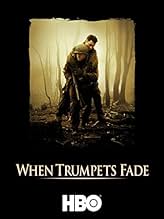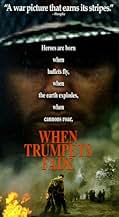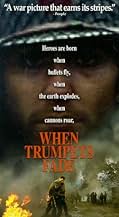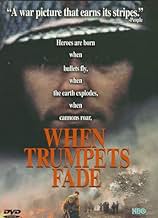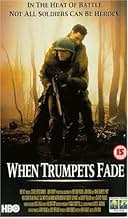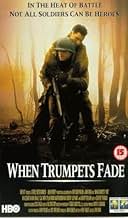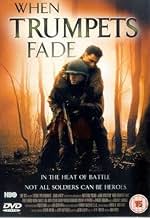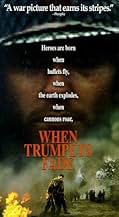A private in the latter days of WWII on the German front struggles between his will to survive and what his superiors perceive as a battlefield instinct.A private in the latter days of WWII on the German front struggles between his will to survive and what his superiors perceive as a battlefield instinct.A private in the latter days of WWII on the German front struggles between his will to survive and what his superiors perceive as a battlefield instinct.
- Director
- Writer
- Stars
- Awards
- 1 win & 5 nominations total
Frank-Michael Köbe
- German Sergeant
- (as Frank Köbe)
Matthew Rutson Cooney
- Driver Corporal
- (as Matthew Ruston Cooney)
Brian Hicks
- 1st Sergeant
- (as Gy. Sgt. Brian Hicks USMC)
John Miller
- Radio Man
- (as Cpl. John Miller USMC)
- Director
- Writer
- All cast & crew
- Production, box office & more at IMDbPro
Featured reviews
this movie accurately portrays what is was like for green recruits to be on the front lines of battle. this movie is about a private Manning who is part of a squad that is entirely wiped out. having been the only one to survive he is promoted to sergeant and put in change of his own squad. After exemplifying himself is an act of heroism he is recommended to be given his own platoon. The movie accurately displays on how friends you have been fighting with and assume so naively would live actually end up dying in your arms. i enjoyed this movie because i enjoy movies about war with violence and gore. however i have to say that there was drama in the script that came up just out of the blue and it didn't really add anything to the story. on a side not Private Sanderson is the man! He should be made next company commander. to conclude i would recommend this movie to anyone who likes band of brothers or any of the call of duty games.
Surprised to find criticism here. This is a film for grown ups. Its about infantrymen, you know, the bulk of the troops in contact with the enemy. Watching other films you might be tempted to think that only Paratroopers and Rangers did any fighting, being made up of highly motivated men with a higher purpose on heroic missions. I note criticism that the cynical nonconformist type should not appear until Vietnam films. I would suggest that a very high proportion of those in combat in WWII also didn't want to be there - my father landed on Sword beach on D-Day and certainly would rather have been somewhere else. We can still respect their sacrifice even though they only wanted to survive, because we are grown up. We don't need a film packed full of sentimentality, directors manipulation and musical cues telling us what emotions to feel... and as to complaining about the plot, how do you defend the absolutely contrived plot of that other film I haven't named (but you can guess which one I mean). See this film. Rant over.
When Trumpets Fade is a very decent war movie, but the fight scenes seem a tad bit fake. They are fighting a battle in Hurtgen Forest at the border of Belgium that seems to be impossible to win, and the platoon attempts many pushes against the German line with no avail. The main obstacle for the US troops is the tanks and flak 88 guns that their artillery cant take out. The newly appointed Sergeant Manning is given a squad of 4 men and ordered to go and take out the flak guns across from the bridge. The movie shows the difficulties and mental stress that comes with leading in war, and how sometimes you have to go to drastic measures to maintain control of the situation. This film is a great tribute to the remembrance of a very important battle that most people don't know about. I recommend it to everyone and you should all learn to love SANDERSON!!!
WHEN TRUMPETS FADE is one of the very best recent WWII films. It doesn't have anywhere near the scope of something like SAVING PRIVATE RYAN, but it captures what it was like to fight as a typical "grunt" in Europe during the winter of '44-'45--and what it's like to fight in a war anywhere--about as well as any movie can. Appropriately enough, its setting is the bloody, intense Battle of Hürtgen Forest, the longest single engagement in the history of the United States Army and one that, ironically, many of the history books largely ignore. Many experts now believe that this battle should have been avoided altogether.
Ron Eldard gives a really fine performance as "Manning," a reluctant draftee-type who's "not about to take a bullet for anyone." One of the best aspects of this film is the way it shows the psychology--and irony--of how Manning's higher-ups use him via a combination of threats, flattery, and promotions just to take one small strategic spot during the battle. Just about everyone else in the film--American or German, I don't believe that there are any non-military characters --gives a commendably believable performance, but special mention goes to Zak Orth, who plays a typical replacement who, young, green, and unsoldierly though he may seem, turns out to be a fine soldier, and Martin Donovan as Captain Pritchett, a typically ruthless, uncaring commander to the men in his company but a bit of a Private Manning himself to his superior officers.
Like most of today's war films, WHEN TRUMPETS FADE is gory, disturbing, and, by necessity (since it's about an unpopular and rather ineffectual battle), somewhat depressing. Still, the dialogue, battle footage, and various other aspects are nothing if not realistic. WHEN TRUMPETS FADE captures the cynicism of war-in-general incredibly well.
Ron Eldard gives a really fine performance as "Manning," a reluctant draftee-type who's "not about to take a bullet for anyone." One of the best aspects of this film is the way it shows the psychology--and irony--of how Manning's higher-ups use him via a combination of threats, flattery, and promotions just to take one small strategic spot during the battle. Just about everyone else in the film--American or German, I don't believe that there are any non-military characters --gives a commendably believable performance, but special mention goes to Zak Orth, who plays a typical replacement who, young, green, and unsoldierly though he may seem, turns out to be a fine soldier, and Martin Donovan as Captain Pritchett, a typically ruthless, uncaring commander to the men in his company but a bit of a Private Manning himself to his superior officers.
Like most of today's war films, WHEN TRUMPETS FADE is gory, disturbing, and, by necessity (since it's about an unpopular and rather ineffectual battle), somewhat depressing. Still, the dialogue, battle footage, and various other aspects are nothing if not realistic. WHEN TRUMPETS FADE captures the cynicism of war-in-general incredibly well.
The film makers obviously intended a memorial to the soldiers who fought and died in the Hurtgen Forest. Though this was not a docudrama, the story had to be true to the context, and for what I could tell, it definitely achieved that goal. The Battle was not a victory for the U.S. forces. The Germans pushed back the Allies during this battle, creating the "bulge" in the front lines. The Battle of the Bulge was a later victory, and it is duly remembered. But the Hurtgen Forest campaign, which was a defeat and by many commentators is viewed as a huge strategic blunder paid for in American blood, has largely been forgotten.
Why does everyone (including viewers) assume that Manning is a coward? Because he is the only survivor of his platoon? Perhaps that assumption accurately reflects the command mindset which caused so many deaths: death is so cheap that one more death is expected, in order to prove valor. (That is not a new concept, "The Red Badge of Courage" had it in a Civil War context; but it also seems to be a motivation for contemporary suicide bombers.) Contrast that with these soldiers' motives for the last mission--when the objective was clear: to save their own lives, rather than to make a noble but unavailing gesture.
Usually war films have more plot. But the Hurtgen Forest campaign was not as carefully plotted as a screenplay. Did any mission in this film seem to have any real point? The battle is accurately reflected here. This is not a compelling film, and it does not attempt to impart any great moral lessons, but it's best virtue is that it is honest.
My late father was in the "Bloody Bucket" (the 28th Infantry, Pennsylvania National Guard--note the red keystone insignia) during this battle, and he was fortunate to have survived. Decades later, he often would say to me that the trees could kill you. I was never really sure what he meant. This film showed me what he meant: the tree tops which were blown off by artillery fire would fall on the soldiers below.
Why does everyone (including viewers) assume that Manning is a coward? Because he is the only survivor of his platoon? Perhaps that assumption accurately reflects the command mindset which caused so many deaths: death is so cheap that one more death is expected, in order to prove valor. (That is not a new concept, "The Red Badge of Courage" had it in a Civil War context; but it also seems to be a motivation for contemporary suicide bombers.) Contrast that with these soldiers' motives for the last mission--when the objective was clear: to save their own lives, rather than to make a noble but unavailing gesture.
Usually war films have more plot. But the Hurtgen Forest campaign was not as carefully plotted as a screenplay. Did any mission in this film seem to have any real point? The battle is accurately reflected here. This is not a compelling film, and it does not attempt to impart any great moral lessons, but it's best virtue is that it is honest.
My late father was in the "Bloody Bucket" (the 28th Infantry, Pennsylvania National Guard--note the red keystone insignia) during this battle, and he was fortunate to have survived. Decades later, he often would say to me that the trees could kill you. I was never really sure what he meant. This film showed me what he meant: the tree tops which were blown off by artillery fire would fall on the soldiers below.
Did you know
- TriviaThe red keystone unit patch signifies that Manning and the others are part of the The 28th Infantry Division. The 28th is a unit of the Army National Guard and is the oldest division-sized unit in the US armed forces.
- GoofsThe Dragons teeth of the Siegfried line are not shown as they really were (and in numerous places still are today). 1) In the movie the line is built with four rows of teeth. In reality the line is built with five rows. 2) The teeth are in reality not made in one size as shown in the movie, but in 3 different sizes, where the first and last rows contain the biggest pillars, the middle three are middle sized, and woven in the last row you can find the smallest. 3) The rows are not placed exactly behind each other. If you would see them from above, you would see an angle in the middle. 4) The rows of pillars are also not built in one line. If you would look over a row from the side, you would see a zigzag of pillars. 5) The pillars in the movie are too close to each other. In reality, the area between two pillars is so big, you can park a car between them (as is done by the author of this comment on numerous occasions).
- Quotes
Pvt. David Manning: If I can help you in any way without endangering my own life, I won't hesitate. But I'm not taking a bullet for anybody!
Lt. Lukas: That's not good enough.
Pvt. David Manning: That's as good as it gets.
- ConnectionsReferenced in Ban the Sadist Videos! (2005)
Details
- Runtime
- 1h 35m(95 min)
- Color
- Sound mix
- Aspect ratio
- 1.33 : 1
Contribute to this page
Suggest an edit or add missing content


